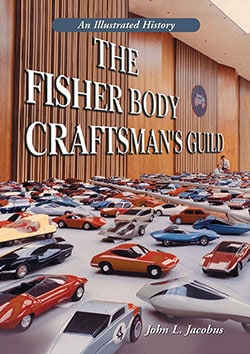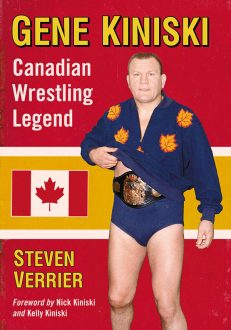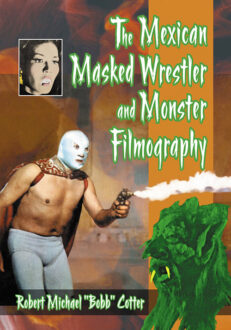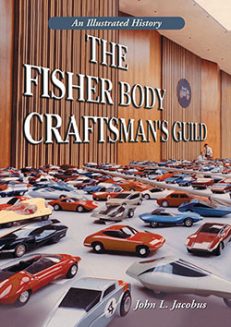The Fisher Body Craftsman’s Guild
An Illustrated History
$39.95
In stock
About the Book
The Fisher Body Craftsman’s Guild was a national auto design competition sponsored by the Fisher Body Division of General Motors. This competition was for teenagers to compete for college scholarships by designing and building scale model “dream” cars. Held from the 1930s through the 1960s, it helped identify and nurture a whole generation of designers and design executives.
Virgil M. Exner, Jr., Charles M. Jordan, Robert W. Henderson, Robert A. Cadaret, Richard Arbib, Elia ‘Russ’ Russinoff, Galen Wickersham, Ronald C. Hill, Edward F. Taylor, George R. Chartier, Charles W. Pelly, Gary Graham, Charles A. Gibilterra, E. Arthur Russell, William A. Moore, Terry R. Henline, Paul Tatseos, Allen T. Weideman, Kenneth J. Dowd, Stuart Shuster, John M. Mellberg, Harry E. Schoepf, and Ronald J. Will, are among those designers and design executives who participated in the Guild. The book also describes many aspects of the miniature model Napoleonic Coach and other scale model cars the students designed.
About the Author(s)
Bibliographic Details
John L. Jacobus
Format: softcover (7 x 10)
Pages: 359
Bibliographic Info: 171 photos (41 in color), tables, appendices, notes, bibliography, index
Copyright Date: 2013 [2005]
pISBN: 978-0-7864-7161-4
eISBN: 978-0-7864-9338-8
Imprint: McFarland
Table of Contents
Preface 1
CHAPTER I INTRODUCTION
Background 7
Purpose of the Guild 11
Public Relations Bonanza 12
Overseas Craftsman’s Guilds 12
Lives Changed 13
Tenets, Values and Virtues 14
Demise of the Fisher Body Craftsman’s Guild 14
Unanswered Questions 15
Fisher Body Craftsman’s Guild Time Line and Milestones 16
CHAPTER II NAPOLEONIC COACH COMPETITION (1930–1948)
Introduction 21
The Fisher Brothers 21
Philanthropy 22
Fisher Body “Royal Coach” Trademark 22
Napoleonic Coach Trademark 23
Youth Scholarship Program 24
Source of Inspiration 24
Napoleonic Coach Designers and Creators 25
Master Model Coaches 26
Plans and Instructions 28
Guild Purpose and Organization 29
Advertising, Promotions and Incentives 30
Napoleonic Coach Competition, Master Craftsman Class 36
Shipping Crate 36
Judging and Scoring Coaches 37
Some Napoleonic Coach Details 38
Coach Builder’s Biographic Survey 39
Some Ingenious Ideas Used to Build a Coach 39
Napoleonic Coach Kits 40
Labor Hours Required 40
The Guildsman, Official Magazine of the Fisher Body Craftsman’s Guild 41
Traveling Coach Competition, Apprentice Craftsman Class, Inaugurated 1934–35 41
1934–35 Traveling Coach Competition Regions 42
CHAPTER III MODEL CAR COMPETITION (1937–1968)
Pre-World War II Model Car Competition (1937–1940) 45
Post-World War II Model Car Competitions (1946–1968) 50
Model Body Styles, Dimensions, and Construction Methods 62
Materials Used by Guildsmen 67
Tools and Equipment Used by Guildsmen 67
Trim from Common Household Items 68
Metal Trim and Brightwork 69
Paint 70
Construction Materials and Methods Used 70
Secrets of Success 75
Subcontractors 82
Guild Clubs 83
GM Dealers 85
Art Center College of Design 85
Stylist’s Genes, Pedigrees and the “Right Stuff” 86
Project Planning 87
Family Know-How 88
Top 18 Brother or Family Scholarship Teams 92
Labor and Time Commitment 93
Shipping Container 94
Deadline 94
Judging and Scoring 95
Quantity of Model Entries for Selected Years 101
Judges’ Workload 104
GM Sons’ Presence 104
1963 and 1966 Competition Demographics (Age, Education) for Awardees Only 105
Program Diversity and International Scope 106
Age Bracket Expansion 107
Fairness 107
Purchased or Duplicated Models 107
The Regional Awards System 108
Competition Integrity 109
National Guild Convention and Banquet 111
Being a National Scholarship Winner 115
Consolation Prize: Certificate of Design and Craftsmanship and Score Sheet 116
Demise of the Fisher Body Craftsman’s Guild 116
Can’t Keep a Good Man Down 118
Legacy 119
Postscript 121
Between pages 124 and 125 are 16 color plates containing 41 photographs
CHAPTER IV THE SEARCH FOR GUILDSMEN
Napoleonic Coach Builders 125
Model “Dream Car” Makers 140
Afterwards 248
Non Sequitur 251
Recovery and Identification 252
Non-Guild Memorabilia 254
Future Guild Reunions 254
Accredited Industrial Design Programs 254
APPENDICES
Appendix A. Fisher Brothers in Brief 255
Appendix B. Skip Geear’s FBCG Foundation and Mini-Museum 256
Appendix C. Coach Builder’s Biographic Survey Form, June 1997 257
Appendix D. Fisher Body Division’s Role During World War II 259
Appendix E. Model Car Competition Rules and Regulations 260
Appendix F. Popular Construction Techniques Used by Guildsmen 262
Appendix G. The Awards and Regional Awards System 268
Appendix H. Detroit Guild Convention Details for Selected Years 270
Appendix I. Analysis of Some Aspects of the 1963 and 1966 Model Car Competitions 273
Appendix J. Overseas Craftsman’s Guilds 278
Appendix K. U.S. Guildsmen by Name, Year(s), University and Vocational Interestt 284
Appendix L. The Fisher Body Crafsman’s Guild: A Model for Educational Reform, by Anthony V. Simone 288
Appendix M. Persons Officially Assigned by GM Styling to Be Design Judges 290
Abbreviations, Acronyms and Terms 291
Acknowledgments 295
Chapter Notes 305
Bibliography 313
Index 323
Book Reviews & Awards
“wonderfully researched, diligently executed piece of social and automotive history. Unique, real American history, and great fun. Highly recommended”—Choice; “interesting…informative…marvelous…highly recommended”—Old Cars Weekly; “one of the most intriguing automotive books of recent times…definitive…a treasure”—Cars and Parts; “exhaustive…unique…worth the price…absolute must”—Hemmings Classic Car; “definitive…extensive…fascinating”—CruZin’ Magazine; “outstanding…thorough…fascinating”—The Automotive Chronicles; “masterfully and meticulously details the history of the Guild”—The Auto Channel.






